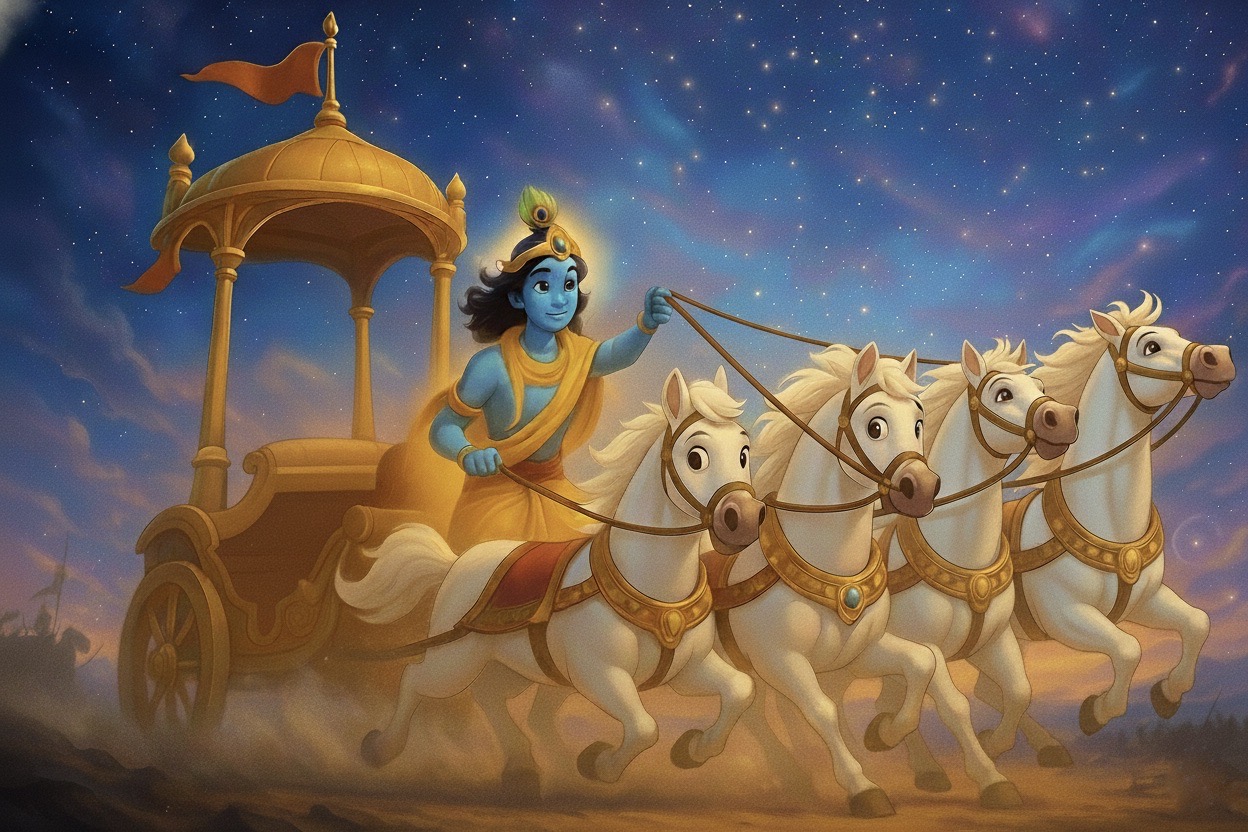On a stormy night over Mathura, when tyranny ruled and hope trembled, a child was born. His name was Krishna — “the dark one,” the one who would bring light.
Born to Devaki and Vasudeva, but taken at birth across the Yamuna to Gokul to escape the wrath of his uncle Kansa, Krishna entered the world as a whisper of destiny.
Lightning split the sky, rivers parted, and legends say — even nature bowed to protect him.
The Cowherd of Vrindavan
Krishna grew not in a palace, but among cowherds, forests, and flute songs in Vrindavan. He was raised by Yashoda and Nanda, who knew him as mischief before they knew him as miracle.
He stole butter, broke pots, and stole hearts with his smile. Yet even in play, destiny followed him — demons sent by Kansa came for him, and one by one, the child who danced with calves defeated giants of darkness.
❝ Whenever there is darkness, I will return as light.❞
Radha — The Soul’s Eternal Song
And then came Radha. She was not just a chapter in his life — she was his truth. Their love was not bound by promise, or marriage — it was the union of devotion and divinity. Radha was not someone Krishna loved — she was love itself.
Their names would never be written apart, for love itself would not allow it: “Radha-Krishna.”
Mathura Calls
When Krishna came of age, he left Vrindavan. The boy with a flute became the prince with a purpose. He confronted Kansa, liberated Mathura, and restored justice — but destiny was far from done with him.
He built Dwarka, a city on the sea. He became a kingmaker, a teacher, a strategist, and a protector — not through conquest, but through dharma (righteous action).
Kurukshetra — The Field of Forever
In the war of Mahabharata, Krishna did not pick up a weapon — yet he was the mightiest warrior on the field. He became Arjuna’s charioteer, guiding him when the warrior trembled between duty and grief.
On that battlefield, when the world stood still, Krishna revealed the essence of existence — the Bhagavad Gita.
❝ You have a right to your actions — but never to the fruits of your actions.❞
❝ Stand up, Arjuna. Your duty is your worship.❞
The Gita was not just counsel for war — it was a song of life, a guide for souls lost between confusion and choice.
Friend, Lover, God
To some, Krishna was God.
To others, he was a friend, a warrior, a philosopher, a child, a lover.
He did not come to be worshipped — he came to teach humanity how to live fiercely, love deeply, and walk the path of truth without fear.
He smiled through war. He played the flute through chaos. He taught the world that life is duty wrapped in music, and divinity lives in the heart that chooses love over power.
The Final Note
Krishna left the world not in glory, but in silence — struck by an arrow in the forest. For he came not to build an empire, but to plant a way of life.
Empires fall. Temples fade. But Krishna remains — in the Gita, in devotion, in music, in the soul’s longing to return to truth.
❝ I am in every heart. I am the beginning, the middle, and the end.❞
